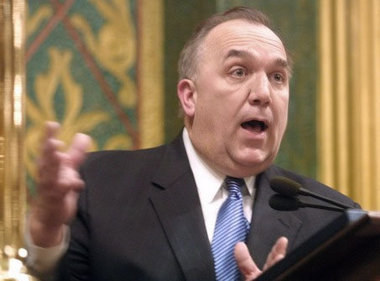Engler’s (political) road not taken
Gov. John Engler was in no mood to raise taxes.
But by 1997, Michigan’s highways were among the worst in the country, with only one state having a higher proportion of structurally deficient bridges.
Those who were part of the discussions in 1997 recalled that Michigan’s business leaders were urging Engler to ask the legislature for a gasoline tax increase.
At first Engler, a conservative Republican, was unmoved.
“I think the tipping point for John Engler was when he saw the roads and bridges deteriorating and saw how it was hurting our economy,” said Rich Studley, who was then a lobbyist for the Michigan Chamber of Commerce and is now its president.
Business leaders and others urged Engler to go for a 10- to 12-cents-per-gallon increase. He agreed only to 4 cents, and that’s what the Legislature approved in 1997, the last time the tax on gasoline and diesel fuel was increased. (Engler, now president of the Washington-based Business Roundtable, did not respond to a request for comment.)
“It was the best we could do at the time,” Studley said. “Often in the legislative process, making progress is the art of the possible.”
It wasn’t enough, he and other business leaders, as well as some politicians and independent researchers, now say.
MDOT had set a goal to bring 95 percent of its freeways and 85 percent of its other roads up to good or fair condition. By 2007, it had come close to that goal for freeways and exceeded it for other roads.
By 2012, both types of roads had begun sliding back toward their 1990s conditions. One-third of Michigan’s state highways and major county and local roads now are rated in poor condition. Forty-eight percent are rated fair, and only 19 percent are in good condition.
That’s because the 4-cent increase was not nearly enough to improve and maintain the roads, a 2013 study commissioned by MDOT concluded. Instead of 4 cents, MDOT needed a 14-cents-per-gallon increase to meet its goals and keep the roads in good and fair condition, according to the study, “The Road Not Taken,” by Gordon Proctor and Associates.
Between 1997 and 2012, the 4-cent increase brought in $2.85 billion, but less than half of that went to MDOT, with the rest going to local governments, as required by state law. Only about one-third of MDOT’s share went to major road and bridge improvements, with the rest paying off loans and for routine maintenance, such as snow plowing.
Competition from China and India for building materials drove up prices by 55 percent, further eroding MDOT’s ability to meet its goals, so in 2001 the state began borrowing money to pay for road improvements.
A Catch-22
As a result, MDOT is paying $240 million a year on a $2.5 billion debt. Had Engler and the Legislature approved a 14-cents-per-gallon increase in 1997, the state could have avoided most of that debt, and it would have more cash flow to pay for road improvements, the study said.
Borrowing money “was a good idea at the time,” MDOT Director Kirk Steudle said. “Then, all of a sudden, you’ve got to pay it back. In retrospect, it wasn’t prudent.”
It was a classic Catch-22. Had MDOT not borrowed money, the state’s roads would be in even worse shape than they are now. But because it borrowed so much, it has nearly maxed out its credit card, just short of the debt cap set by state Transportation Commission policy. It is spending money on interest that otherwise could go into better roads.
“Easy solutions such as additional borrowing or federal bailouts are unlikely,” according to “The Road Not Taken” report.
“Without substantial new investment, the Michigan state highway conditions will degrade rapidly, and many of the gains of the past 16 years will be lost,” it said, adding ominously: “Otherwise, Michigan will be on a path to return to the pot-holed pavements and load-limited bridges of the 1990s.”
Business Watch
Covering the intersection of business and policy, and informing Michigan employers and workers on the long road back from coronavirus.
- About Business Watch
- Subscribe
- Share tips and questions with Bridge Business Editor Paula Gardner
Thanks to our Business Watch sponsors.
Support Bridge's nonprofit civic journalism. Donate today.
See what new members are saying about why they donated to Bridge Michigan:
- “In order for this information to be accurate and unbiased it must be underwritten by its readers, not by special interests.” - Larry S.
- “Not many other media sources report on the topics Bridge does.” - Susan B.
- “Your journalism is outstanding and rare these days.” - Mark S.
If you want to ensure the future of nonpartisan, nonprofit Michigan journalism, please become a member today. You, too, will be asked why you donated and maybe we'll feature your quote next time!


 Gov. Engler did not want to raise taxes but agreed to a 4-cent-per-gallon fuel hike in 1997 to repair the state’s roads. (courtesy photo)
Gov. Engler did not want to raise taxes but agreed to a 4-cent-per-gallon fuel hike in 1997 to repair the state’s roads. (courtesy photo)